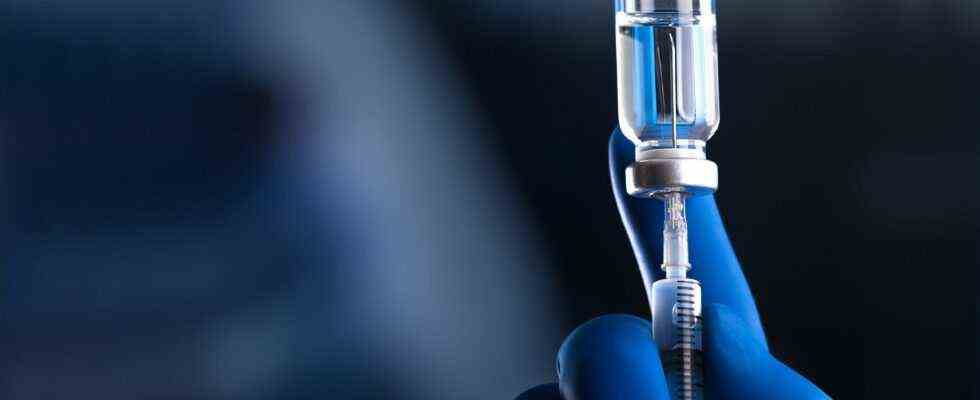New vaccine: strong immune response against SARS-CoV-2
Four vaccines against the COVID-19 disease caused by the SARS coronavirus are currently approved in the European Union. Further resources are being researched. A study has now shown that another vaccine developed in Germany shows a strong immune response against the virus.
In November 2020, under the direction of Prof. Dr. Juliane Walz started the clinical testing of a self-developed vaccine (CoVac-1) against SARS-CoV-2 in the KKE Translational Immunology of the Medical Clinic. The results of the phase I study are now available and demonstrate a potent activation of the T cell response against the coronavirus. The results were recently published in the journal “Nature” released. The study is currently in the second phase.
The idea for the vaccine comes from cancer immunotherapy
As in a current one Message of the University Hospital Tübingen is explained, T cells play an important role in COVID-19 disease. The research team led by Prof. Walz, head of the clinical study, has already proven this in several scientific publications.
As part of this research work, those peptides were identified in the blood of people with survived COVID-19 disease that are important for recognition and long-term protection by T cells, especially in the case of SARS-CoV-2.
“Exactly the peptides that play an important role in long-term immunity after a previous SARS-CoV-2 infection are now used in our CoVac-1 vaccine,” explains Walz.
Peptides are short proteins that are presented on the surface of tumor cells, but also on virus-infected cells, to the immune system and here especially to the T cells. This enables the immune system to recognize “foreign” and infected cells and then to eliminate them.
The idea for the vaccine comes from cancer immunotherapy, one of the main research areas of the Tübingen immunologists.
Potent activation of the T cell response
CoVac-1 was used in a clinical phase I study in healthy participants between the ages of 18 and 80 years. An extremely potent activation of the T cell response against the coronavirus SARS-CoV-2 could be demonstrated here with good tolerability.
As part of the study, a total of 36 subjects were vaccinated once. Mild side effects such as headache and fatigue were observed in a few of them, while serious side effects did not occur. Local hardening developed at the vaccination site in all of the participants.
“This local reaction is expected and desired for our vaccine. It is an expression of the formation of a depot at the vaccination site, which prevents the vaccine from breaking down rapidly and thus enables a long-lasting immune reaction, ”says Dr. Jonas Heitmann, one of the first authors of the study.
According to the experts, all study participants had the desired broad and strong T-cell immune response against SARS-CoV-2 four weeks after the vaccination. In the first follow-up examinations, these immune responses remained in the same strength.
In addition, the T-cell responses activated by CoVac-1 are much more pronounced than those in people who have recovered after natural infection and are also more potent than the T-cell immunity generated by currently approved mRNA or vector vaccines.
In contrast to the currently approved vaccines, the CoVac-1-induced T-cell immunity is not only directed against the spike protein, but against various virus components. The effectiveness of the vaccine is not negatively influenced by any of the previously known SARS-CoV-2 variants.
Phase II study started
According to the information, CoVac-1 is produced in the active ingredient peptide laboratory and the so-called GMP unit of the University Hospital and the Medical Faculty of Tübingen. Here, too, we draw on our many years of experience and expertise in the production of vaccines for cancer patients.
The clinical evaluation of the vaccine takes place in the KKE Translational Immunology, a facility in the Department of Internal Medicine at the University Hospital. This was established in order to be able to test innovative immunotherapy concepts as quickly as possible in initial clinical studies so that patients can benefit from new research findings as quickly as possible.
On the basis of these study results, the phase II study was started in June, which is investigating CoVac-1 in patients with congenital or acquired immunoglobulin deficiency. These include, for example, leukemia or lymphoma patients who, due to their illness or therapy, cannot build up sufficient antibody-mediated immunity. (ad)
Author and source information
This text complies with the requirements of specialist medical literature, medical guidelines and current studies and has been checked by medical professionals.
Sources:
- University Hospital Tübingen: In-house developed vaccine against SARS-CoV-2 shows strong immune response, (accessed: November 24, 2021), University Hospital Tübingen
- Jonas S. Heitmann, Tatjana Bilich, Claudia Tandler, Annika Nelde, Yacine Maringer, Maddalena Marconato, Julia Reusch, Simon Jäger, Monika Denk, Marion Richter, Leonard Anton, Lisa Marie Weber, Malte Roerden, Jens Bauer, Jonas Rieth, Marcel Wacker , Sebastian Hörber, Andreas Peter, Christoph Meisner, Imma Fischer, Markus W. Löffler, Julia Karbach, Elke Jäger, Reinhild Klein, Hans-Georg Rsameee, Helmut R. Salih & Juliane S. Walz: A COVID-19 peptide vaccine for the induction of SARS-CoV-2 T cell immunity; in: Nature, (published: 23.11.2021), Nature
Important NOTE:
This article is for general guidance only and is not intended to be used for self-diagnosis or self-treatment. He can not substitute a visit at the doctor.

